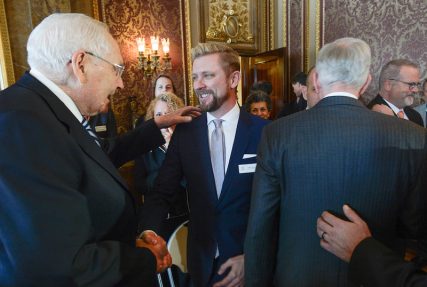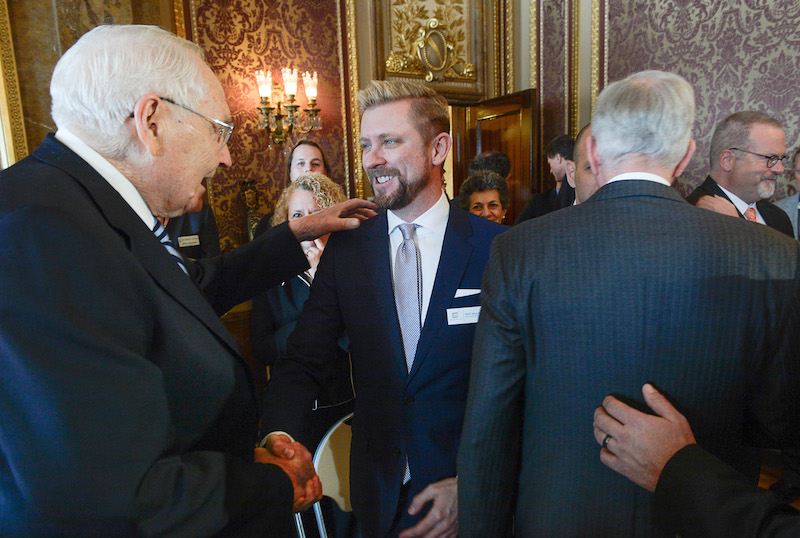
L. Tom Perry, second in line for the LDS Church’s presidency, left, shakes hands with Troy Williams, executive director of the gay rights group Equality Utah, following a press conference at the Utah Capitol. Photo by Francisco Kjolseth / The Salt Lake Tribune.
Yesterday afternoon, the Brookings Institution sponsored two high-profile panels on the new legislation just passed by Utah that guarantees LGBT residents nondiscrimination in housing and employment. Called “Gays, Mormons, and the Constitution,” the panels asked whether there are “win-win answers” for both LGBT rights and religious conscience.
The consensus seemed to be yes.
No high-ranking Mormon leaders were on the panels, but the influence of the LDS Church was apparent throughout. Mormon panelist Mike Leavitt acknowledged that he has helped advise the Church in his role as a former governor of Utah, and Salt Lake County mayor Ben McAdams described the years-long détente that has characterized relations between the Church and the LGBT community since the Church’s roundly criticized involvement in Proposition 8 in California in 2008.
Leavitt’s remarks demonstrated the brand of pragmatism that I’m sensing as a new party line from the Church.
Neither the LGBT community nor the LDS Church obtained everything it wanted in the legislation. Leavitt said this is typical of politics, where each side starts with an uncompromising, “zero-sum game” approach and then begins to move to meet the needs of both sides simultaneously.
Compromise is not always popular. We’ve seen in the last two weeks that the Church’s conservative partners are disappointed by its softened position. The New York Times reported last week that the Southern Baptist Convention and the nation’s Roman Catholic bishops have parted ways with the LDS Church because of the Utah legislation.
Moreover, some conservatives within the Mormon fold aren’t happy with the compromises the Church is making. Utah radio host Cherilyn Eager tweeted during the panels yesterday:
While conservatives think the Church has gone too far, liberals and some LGBT activists have criticized the bill for not going far enough. It doesn’t address whether businesses have to serve gay customers, for example, or other public accommodations.
The LDS Church is walking a tightrope here, wanting to stand firm on its doctrinal opposition to homosexuality and same-sex marriage while also doing what law professor Robin Fretwell Wilson said is the “fundamentally right and decent” thing: protecting people who are vulnerable to oppression.
When asked directly about whether the LDS Church would ever change its doctrine about same-sex marriage, Leavitt replied that “the doctrine of the Church is as it is and as it will remain . . . marriage is between one man and one woman.”
This exact balance was in full play last Friday when LDS Apostle D. Todd Christofferson was asked about marriage equality in an interview for KSL. As the Salt Lake Tribune reported, Elder Christofferson explained that the Church won’t take disciplinary action against Mormons who support same-sex marriage.
In fact, he affirmed that they can even be public about such support by posting about their views on social media, belonging to gay-friendly Mormon organizations like Affirmation, and marching in gay pride parades without fear of reprisal. I haven’t heard clarification on that before, and it was welcome news.
What they can’t do is organize efforts to oppose the Church’s stated position or change its policy.
It’s not exactly “live and let live,” but it’s a huge leap forward over some previous LDS leaders’ statements on same-sex marriage, such as when Pres. Boyd K. Packer warned in 2010 that “If we’re not alert, there are those today who not only tolerate but advocate voting to change laws that will legalize immorality, as if a vote would somehow alter the designs of God’s laws and nature … what good would a vote against the law of gravity do?”
Same-sex marriage is now a reality in Utah, and many support it. The state has not crumbled into the Great Salt Lake. Life has gone on, and the Church has begun building bridges.
It’s good to see that while change is sometimes slow, it does happen.







